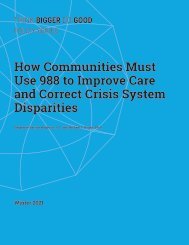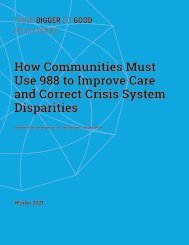Systemic, Racial Justice–Informed Solutions to Shift “Care” From the Criminal Legal System to the Mental Health Care System
Create successful ePaper yourself
Turn your PDF publications into a flip-book with our unique Google optimized e-Paper software.
Wraparound Services and EBT Provision<br />
Essential <strong>to</strong> improving mental health outcomes, particularly for those with<br />
serious mental illness involved in <strong>the</strong> criminal legal system, is access <strong>to</strong><br />
supportive, wraparound services that promote stability and address <strong>the</strong> social<br />
determinants of mental health, i.e., those “conditions in which people are born,<br />
grow, live, work, and age,” including (but not limited <strong>to</strong>) poor education, poverty,<br />
suboptimal housing, un- and under-employment, job insecurity, and food<br />
insecurity (29). Medicaid often provides more coverage options than does private<br />
insurance for certain community-based treatment interventions (9). States can<br />
and should opt for <strong>the</strong>ir Medicaid plans <strong>to</strong> fund wholistic, ameliorative services<br />
for noninstitutionalized persons with mental health disabilities and substance<br />
use disorders, especially individuals involved in <strong>the</strong> criminal legal system or<br />
reentering society from incarceration. In addition <strong>to</strong> expanding access, plans<br />
should offer evidence-based interventions, such as supportive housing, supported<br />
employment, crisis services, and assertive community treatment. On <strong>the</strong> basis of<br />
data regarding EBT adoption, federal incentives for SMHAs <strong>to</strong> administer ra<strong>the</strong>r<br />
than just fund <strong>the</strong>se programs is recommended. Ideally, <strong>the</strong> federal government<br />
would take steps <strong>to</strong> remove any barriers preventing states from making <strong>the</strong>se<br />
reforms. Cost, however, can act as a deterrent. State officials may become<br />
concerned that provision of <strong>the</strong>se services will exceed funding levels. Although<br />
some states have identified a workaround (i.e., limiting eligibility) and rely on<br />
natural limits (i.e., lack of service providers), as discussed herein such approaches<br />
undermine <strong>the</strong> ultimate goals of expanded mental health care access. Thus a<br />
more suitable solution would be <strong>to</strong> increase funding levels for <strong>the</strong>se services so<br />
that more individuals can benefit from <strong>the</strong>m.<br />
<strong><strong>System</strong>ic</strong>, <strong>Racial</strong> <strong>Justice–Informed</strong> <strong>Solutions</strong> <strong>to</strong> <strong>Shift</strong> <strong>“<strong>Care</strong>”</strong> <strong>From</strong> <strong>the</strong> <strong>Criminal</strong> <strong>Legal</strong> <strong>System</strong> <strong>to</strong> <strong>the</strong> <strong>Mental</strong> <strong>Health</strong> <strong>Care</strong> <strong>System</strong> 19

















